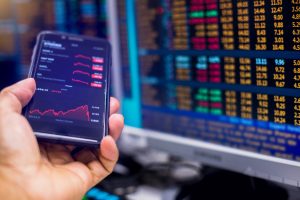What is forex?
Forex, also known as foreign exchange, is a decentralized market where the world’s currencies are traded. It operates 24 hours a day, five days a week, and allows individuals, companies and financial institutions to buy and sell currencies for both investment and trade purposes.

Forex is the largest financial market in the world, with an average daily trading volume of over $6 trillion. It is a decentralized market that operates 24 hours a day, five days a week, and allows individuals, companies, and financial institutions to buy and sell currencies for both investment and trade purposes.
Forex is unique in that it is a global market that operates around the clock, making it accessible to traders from anywhere in the world. This has created a highly competitive environment, where traders can participate in the market from the comfort of their own homes.
Forex traders can choose to buy or sell any currency pair, such as the US dollar and the euro, and can make money from changes in exchange rates. When the value of one currency rises relative to another, traders can buy the currency that has been appreciated and sell the one that has depreciated, making a profit in the process. This is known as taking a long position. Alternatively, traders can also take a short position, which involves selling the currency that has appreciated and buying the one that has depreciated.
Forex trading can be done through a forex broker, who acts as an intermediary between the trader and the market. The broker provides the trader with access to the forex market, as well as software to execute trades and manage their accounts. Forex brokers also offer a range of tools and resources to help traders make informed trading decisions, including news and analysis, charts, and technical indicators.
Forex trading is not without its risks, however. The market can be highly volatile, with rapid fluctuations in exchange rates that can result in large losses. This makes it important for traders to have a clear understanding of the market and to develop a solid trading plan that outlines their goals, risk management strategy, and exit strategy.
One of the key factors in successful forex trading is developing a solid understanding of technical analysis. Technical analysis involves studying charts and other market data to identify trends and make predictions about future price movements. Traders use a variety of technical indicators, such as moving averages, to help them make trading decisions.
Another important aspect of forex trading is risk management. Effective risk management involves setting stop-loss orders, which automatically exit a trade when a certain price level is reached, and taking steps to limit the amount of capital at risk in any one trade. Traders can also use leverage to increase their potential returns but must be careful to avoid over-leveraging, which can result in large losses.
In conclusion, forex is a highly dynamic market that offers traders the opportunity to profit from changes in exchange rates. While it can be highly lucrative, it is also risky and requires a solid understanding of the market, technical analysis, and effective risk management strategies. By taking the time to educate themselves about the market and developing a well-thought-out trading plan, traders can increase their chances of success in the forex market.